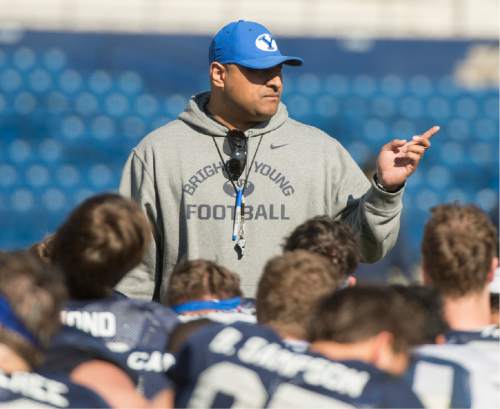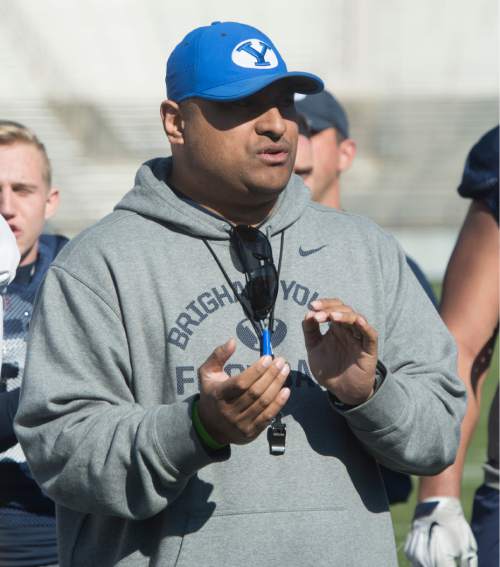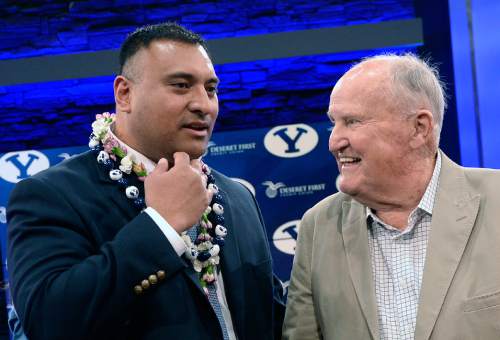This is an archived article that was published on sltrib.com in 2016, and information in the article may be outdated. It is provided only for personal research purposes and may not be reprinted.
Here's a big conclusion drawn from one small truth that's hardly a secret: BYU is not fully committed to winning at the highest levels of college football because it doesn't pay its head coach market value, to get him or keep him.
Based on conversations with sources associated with the school's athletics, that's not likely to drastically change anytime soon, although it has gotten a bit better. It's not as though Kalani Sitake is making chump change — estimates on his salary range as high as $1.5 million a year, with half of that amount coming from the school, half coming from a wealthy group of BYU boosters known as the Coaches Circle whose purpose is to raise — or donate — money with the aim of the Cougars hiring and retaining quality coaches in both basketball and football.
But even with those contributions, BYU lags behind other top-drawer football programs some school administrators — but not all along BYU's power chain — would like to emulate. Successful head coaches around the country make big dollars; Nick Saban gets more than $7 million, Mike Krzyzewski $7.3 million. Kyle Whittingham at Utah makes close to double what Sitake will be paid. Same with Bronco Mendenhall, now at Virginia.
If Sitake's take is around the estimate — unlike state institutions, BYU doesn't make that information public — that would rank him about 60th on a list of coaches' salaries, roughly the equal of UConn and Fresno State and East Carolina. It's a far cry from the Top 20, which drops off at about $3.8 million.
The question is: Do you get what you pay for?
As sick as that aforementioned money is, a top-flight coach is worth every dime he is given. The stack of cash generated by winning, in most cases, is tall. Sitake is a first-time head coach, but what happens if he wins big at BYU over the next few seasons? Will the Cougars be able to hold onto him? Would they be willing to pay what the big boys do? Could the Coaches Circle get turned loose and reel him back in?
Probably not.
Unless Sitake follows in the line of longtime coach LaVell Edwards, who stayed at BYU even though he had bigger offers elsewhere, including a gig as head coach of the Detroit Lions.
When Edwards was asked a few years ago by Tribune writer Jay Drew about BYU's limited pay, he said: "That's a very personal thing. The university is what it is. If you are a coach and the pay scale here is one of your [main] concerns, then maybe it isn't right [for you]. I don't really have any comment further, except to say [BYU's salary structure] is different, no question."
Added Tom Holmoe: "We do things very uniquely around here."
Which is to say, they do it on the cheap.
A few factors come into play: First, there's a cultural kind of work-for-less deal in Provo, a call-the-job-a-church-calling sort of dynamic. That's not universally true, but it does exist. Second, the pool of coaches from which BYU can draw is small. That could work both ways, putting a premium on an extraordinarily successful LDS head coach or getting a guy in the group who might end up pretty good who might want to coach at his church's school.
The latter notion didn't work out so well in the days after Mendenhall announced he was leaving with the courting of Navy coach Ken Niumatalolo, to whom BYU offered its head coaching job and was turned down. Niumatalolo didn't feel comfortable with the way BYU stumbled through that process, and the money was less than what he could get by staying at Navy.
Procedure is important and money does talk, even among the faithful.
Like Edwards, there are exceptions. Dave Rose has had opportunities to leave BYU for more money at a number of schools, some of which might surprise folks. He has declined those offers, utilizing them to his advantage in prying more pay out of BYU, but not as much as he would have received elsewhere.
Still, at some level, the number of zeros in the head coach's paycheck does speak to the commitment of the school. Exceptions do exist, but they are rare. It could be on account of some kind of financial morality play. It could be that BYU leaders don't believe the recruits the program can draw are talented enough to justify more pay for one coach. Or it could be that the priority put on football at BYU isn't all that high on the part of the school's board of trustees.
It could be that the priority is higher among BYU fans.
Either way, as Power 5 schools continue to collect more and more money, the gap in pay could increase.
There's no telling how Kalani Sitake will do in his initial seasons in Provo. The Cougars' 2016 schedule was recently ranked the fourth most difficult in the nation by CBSSports.com. If he does win against that kind of competition, he'll be worth more than what BYU is paying him.
Sitake will know that and so will everybody else.
GORDON MONSON hosts "The Big Show" with Spence Checketts weekdays from 3-7 p.m. on 97.5 FM and 1280 AM The Zone. Twitter: @GordonMonson.







